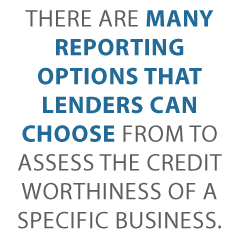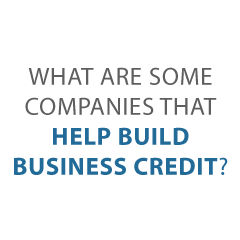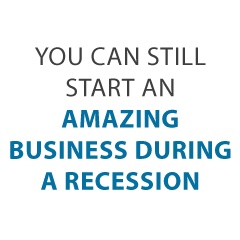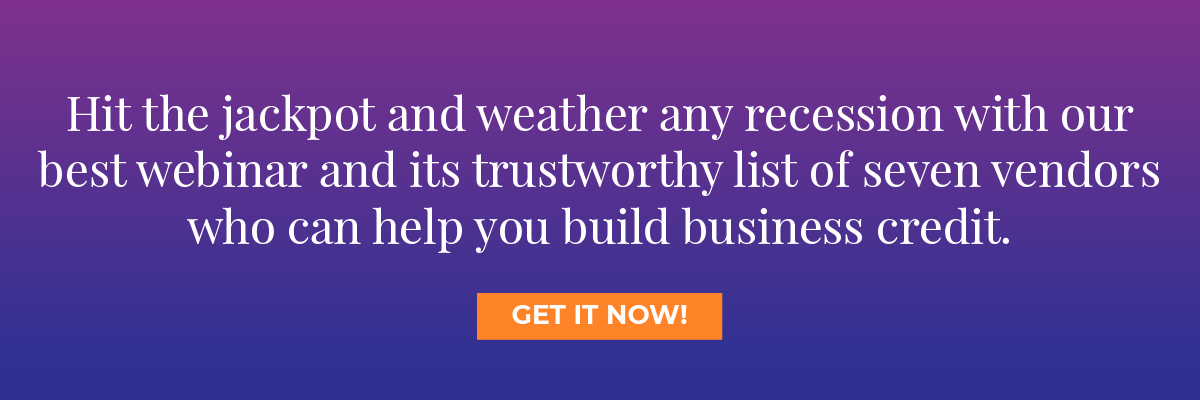It is possible to build business credit, even during hard times. Of course it’s easier to already have business credit when the hard times hit. However, if you find yourself in need of funding to get through this Covid caused rough spot, business trade lines in a recession can help.
Business Trade Lines in a Recession: Build Business Credit Even in Hard Economic Times
When the economy heads south, it can seem impossible to build anything good. Most of us tend to go into survival mode, happy if we can just hang on. Building, growing, and expanding are the last things on our mind. The truth is though, you can use business trade lines in a recession to build business credit.
This can allow you to be in the unique position to take advantage of opportunities during a recession that others will not be able to benefit from, because they are still in survival mode.
Imagine, if a wholesaler offers a special on inventory and you have business credit that allows you to take advantage, while your competitor does not, you have a clear advantage. But how do you do it? How do you use business trade lines in a recession to build business credit? The simple answer is, the same way you do any other time. There is a little more to it however.
Business Trade Lines in a Recession: Where to Start
Before business trade lines in a recession will do you any good, you have to do some prep work. This prep work lays a solid foundation to build strong business credit on, even during a recession. If you skip this part, you are likely to find you can’t even get started with business credit. These first steps truly are essential before you can take advantage of the help business trade lines can offer.
These steps are best taken before you start your business, but if you are already up and running, all is not lost. Just start where you are.
You need to consider how your business is set up. For many new business owners, starting a business just kind of happens. You have something you do that you love, and you decide it’s time to use it to make money. You may find a location or start from your home. Likely you simply mingle funds in your personal bank account. You have a business name but the business address, email, and phone number are all the same as your personal contact information. It is sort of a natural progression.
Hit the jackpot and weather any recession with our best webinar and its trustworthy list of seven vendors who can help you build business credit.
If you want to establish business credit, you have to be purposeful to set up your business separate from yourself. This means doing a few things differently.
How to Establish Your Business as a Separate Entity
First, you have to incorporate. Running as a DBA, sole proprietorship, or partnership really won’t cut it. You can choose from running as a corporation, S-corp, or LLC based on your specific needs, but it needs to be one of these three. Each one comes associated with a different cost and varying levels of protection, but each will serve the purpose of separating your business from yourself.
Next, establish separate contact information for your business. You need a business address, email, and phone number that is different from your personal address, email, and phone number. The phone number should be from a toll-free exchange, and your email address should be associated with your professional website. Do not use a free service such as Gmail or Yahoo, and don’t ignore the professional website part. These days, a poorly put together website can ruin a business.
Pick Your Numbers
After these first steps are complete you need to play the numbers game. In order to establish business credit, your business has to have two numbers associated with it. The first is an EIN. This is an identifying number for a business, similar to a social security number. You can get one for free on the IRS website.
The next is a DUNS number. This is a number assigned by Dun & Bradstreet, the largest and most commonly used business credit reporting agency. To have a business credit file with them, you must have a DUNS number. You can apply for it for free on their website, but note that they will definitely try to sell you other services. Be strong. The number is free and the other services are not necessary.
Separate the Finances
Open a separate bank account for your business. This is the account through which all business financial transactions should run. If your business is already up and running, it may take you some time to get everything switched over, but it will be worth it. Not only will is help separate your business from your personal credit, but it will also help tremendously when it is time to do your taxes.
The Magic of Business Trade Lines In a Recession:
Plant the Seed, Hammer the Nail
Okay, so these steps ensure that your business is on record as a business at all the right places. As soon as something credit related is reporting, it will have a place to go. How do you get something reported though? You need accounts that will report your on-time payments. Lenders will not even consider extending you credit however, if you don’t have a credit score, or if your credit score is bad. How do you break into the circle?
You can find a tiny crack with business trade lines in a recession. These are vendors that sell things you use in the everyday course of business, and they are vital to building business credit. Here’s how it works. They will extend net30 terms on invoices, without a credit check, and then report your invoice payments to the business credit reporting agencies.
For most of these vendors, you will have to make a few initial purchases before they will extend net30 terms. Some want to see a minimum time in business or a certain revenue level as well. We have compiled a list of six easy approval options to help you get started with business trade lines in a recession.
Hit the jackpot and weather any recession with our best webinar and its trustworthy list of seven vendors who can help you build business credit.
Strategic Network Solutions
This company sells eBooks, software, and even office supplies. You do have to register to see their products, but the process if fast and easy. You will have to make a $75 or more initial purchase to be eligible for a net30 account of up to $1,000 for a new business. The credit line can increase in increments of $500 if balances are paid in full and on-time. Strategic Network Solutions reports to Experian and Credit Safe.
Grainger Industrial Supply
Granger industrial Supply sells industrial equipment for outdoors as well as standard tools, and more. To gain net 30 approval you will need a business license, a DUNS number, and bank reference. They report to Dun & Bradstreet.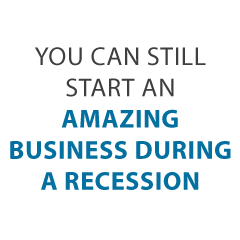
Summa Office Supplies
Another office supply provider, you can order anything from paper to staples, pens to printer ink, and pretty much anything you can think of in between from Summa. They require a $75 initial purchase, and will approve up to $2,000 on net 30 terms. They report to Eqifax and D&B.
Quill Office Supplies
Quill also sells standard office supplies. You will need to make an initial purchase. They’ll usually put you on a 90 day prepay scheduled, but after ordering for 3 months in a row, they’ll typically approve net 30 terms. They report to Dun & Bradstreet.
Uline
Uline sells a lot of things, but they specialize in packing and shipping equipment and janitorial supplies. You’ll need to place an initial order, and they do ask for a bank reference and two other references. They report to Dun & Bradstreet, so you’ll of course need a DUNS number too.
Hit the jackpot and weather any recession with our best webinar and its trustworthy list of seven vendors who can help you build business credit.
What Comes After Business Trade Lines in a Recession?
Using business trade lines in a recession is all part of the working with starter vendors. After you have a few of these accounts reporting, you can apply for store credit card accounts, then the fleet cards, and finally general use cards. Here’s what you need to know about each type of card, and what happens when you get to the top.
Business Trade Lines In a Recession :Store Cards
It’s hard work to get something going. Rolling a tire, pushing a car to jump start it, and starting a business all take an extra exertion of energy. Once a thing is going, you can sort of set it on cruise control. Store cars are the beginning of your business credit cruising phase.
In building business credit, after you have enough business trade lines in a recession, you can start applying for store credit. These are credit cards issued by specific retailers such as Office Depot and Best Buy. Apply for these accounts, purchase things you need in the everyday course of running your business, and make your payments on-time. Your business credit score will grow stronger by the day.
Business Trade Lines in a Recession: Fleet Cards
Keep cruising through and after enough store cards are reporting, apply for fleet cards. These cards are issued by fleet companies such as Shell and Fuelman. They can be used to purchase gasoline or for automobile maintenance and repairs. Once you have enough of these accounts reporting, it’s time for the general use cards.
Business Trade Lines in a Recession: General Use Credit Cards
General use credit cards are end game. Hold the wheel steady, and you can cruise here forever. These cards consists of the traditional Visa, Master, and American Express cards not associated with a specific store or type of purchase. Use this wisely, continue to make consistent, on-time payments, and your business credit will be rock solid.
Warning Signs
Setting the cruise doesn’t mean you get to be disengaged. Building business credit with business trade lines in a recession takes a lot of work. It feels good when you have a business credit score that is building quickly and you can relax a little. You don’t have to work as hard, but you still have to steer, and watch the signs.
Neglecting to make payments consistently on-time could throw you in a ditch. You’ll have to climb out and start all over again. Be careful.
Why Business Credit?
You may be asking yourself the question, why bother? You may have personal credit that will allow you to get what you need to run your business without needing to work with business trade lines in a recession. It can take time, and better prices may be available elsewhere. What’s the point? Why do you need business credit?
The fact is, it’s never a good idea to have your business transactions on your personal credit report, recession or not. There are a few reasons for this. First, if your personal credit takes a hit, it can affect your ability to run your business.
Also, business credit cards based on personal credit often have a lower credit limit, and business transactions are often very large. If you get close to your limit, your score will take a hit even if you make your payments like you should due to the high debt-to-credit ratio.
By having cards based on your business credit, you can get higher limits, and your personal credit will not be affected by business transactions. This way, you do not have to worry about business transactions keeping you from applying for personal credit you may need to purchase a car or make home improvements.
Build Business Credit With Business Trade Lines in a Recession
Regardless of your personal credit score, you really do have to work with business trade lines in a recession to start your business credit. After you establish your business and prepare the way for your business transactions to be reported to your business credit profile, you will need accounts to report. Most credit cards will not extend credit to a business with no credit, or bad credit. Working with business trade lines that do not do a credit check is a way around that. You can start building business credit in your business name without your personal credit score ever being involved. It’s a win/win for you and for your business.
The post Business Trade Lines In a Recession Can Help Create a Unique Opportunity appeared first on Credit Suite.


